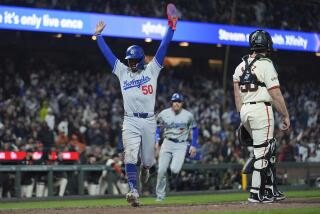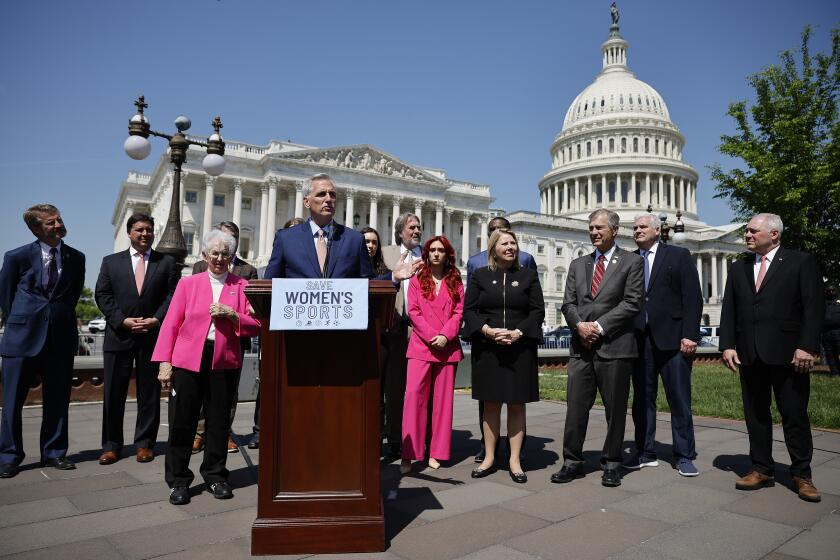No Progress Reported in Baseball Negotiations : Today’s Talks Put Off Until Monday as the Strike Deadline Draws Closer
With 19 days to go before Aug. 6, the baseball strike deadline set by the major league players’ union, owners and labor representatives met for three hours here Thursday but again reported no progress toward a settlement.
Further talks were postponed from today until Monday after management spokesman Lee MacPhail asked for time to consult with team owners.
In eight months of talks, the pace has been slow and there was no change Thursday. Donald Fehr, the union leader, said that once again the owners had made no offer on the key economic issue, and MacPhail confirmed this.
Fehr and MacPhail, however, both expressed the view that there is time to resolve matters by the deadline if both sides get down to business.
The issue that was not discussed Thursday involves how big a percentage of the club’s $180 million annual television contract will go into the players’ pension fund.
The players have traditionally gotten roughly one-third of the national TV revenue, and holding to that formula now would result in a huge increase over the last contract four years ago--from $15.5 million to $60 million. The owners say that since players’ salaries have nearly doubled in that time, that would be unfair to them.
Underlying the dispute are widely differing reports on the present financial situation of the major leagues.
The owners say that the clubs as a whole suffered $43 million in losses in 1984. The union says that its analysis, which disregards deferred salaries, shows a $9 million profit.
The argument continued Thursday with release by the union of a 47-page paper by Stanford economics professor Roger Noll, questioning some of the owners’ reported losses.
Noll said that financial statements issued by each team “are essentially useless for determining its viability as an enterprise” without much more information on the tax ramifications and ties by owners into other corporate interests.
He added: “Indeed, a truly accurate picture of the profitability of baseball may well be impossible.”
Even so, Noll, in a team-by-team analysis, rated only 9 of the 26 clubs as profitable, compared to the owners’ analysis of eight as profitable. Noll questioned, however, whether several of the others were truly unprofitable or as unprofitable as the owners’ claim they are.
He cited 11 examples that he claimed resulted in understatements by the owners amounting to $25.9 million in revenue.
The Stanford professor said that the Dodgers were “baseball’s answer to the Denver mint,” in short, highly profitable. He said that the Angels on the surface may seem to be unprofitable, but that they are underpaid by a corporate affiliate, Golden West Broadcasting, for broadcasting rights and if this were subject to “accurate adjustment,” they would be “viable.”
The Angels, he noted, pay the second-highest salaries in baseball.
Regarding the Dodgers, Noll said:
“The Los Angeles Dodgers are probably the most successful sports franchise that has ever been fielded. Gate receipts are double the average for baseball, and total revenues outdistance all others.
“Operating income is well over $5 million, and net income is over $6 million. The Dodgers actually collect more in interest than they pay, and they also make substantial profits in renting the stadium for other uses.
“Yet these profits, richly deserved as they are for the best managed team in sports, vastly understate the value of the Dodgers to the owners. The Dodgers’ general and administrative expenses are a whopping $8.4 million, compared to $2.8 million on average (for all clubs). The principal cause is that salaries of front-office personnel, including benefits, total $4.4 million, which is about four times the average for baseball, and more than double that of the second-place team.
“Obviously, owners are taking out several million dollars a year . . . in the form of salaries, fringe benefits and other prerequisites. The travel budget, for example, is four times the average for all of baseball.
“Without further breakdown of these costs--and especially, who benefits from them--it is not possible to pinpoint exactly by how much the profits of the Dodgers are understated, but a conservative estimate is at least $3 million. Hence, in calculating the overall financial performance of baseball, this must be added into the total net revenues for the sport to obtain an accurate picture.”
On the Angels, Noll said:
“Until recently, the Angels were affiliated through ownership with Golden West Broadcasting, which owns the radio and television stations that broadcast Angel games.
“(The Angels) received $4.6 million for radio and television rights in 1984, a large number that is nevertheless low compared to the revenue potential of Los Angeles. While it may be unrealistic to value the Dodgers and the Angels at the same level, the book difference of nearly $2 million in broadcasting rights is excessive.
“Conservatively, the Angels should do as well as, say, Philadelphia--a team in a much smaller market--which earned $1 million more than the Angels in 1984.”
Noll’s analyses were challenged by MacPhail, who labeled them as “ridiculous” in many respects. MacPhail said, however, that he had not had a chance to read or study in detail the document and therefore could not be specific in his rebuttal.
More to Read
Get our high school sports newsletter
Prep Rally is devoted to the SoCal high school sports experience, bringing you scores, stories and a behind-the-scenes look at what makes prep sports so popular.
You may occasionally receive promotional content from the Los Angeles Times.






